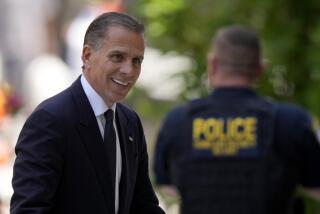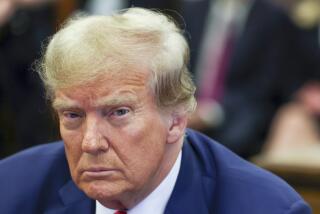Libby, Cheney will stay off the stand
WASHINGTON — Abruptly reversing course, lawyers for I. Lewis “Scooter” Libby announced Tuesday that neither the defendant nor Vice President Dick Cheney would testify at Libby’s trial on charges of lying to federal investigators -- a high-wire maneuver that drastically reduces the opportunity for presenting defense evidence and means the case will go to the jury early next week.
In a surprise disclosure in federal court, Libby’s lawyer Theodore Wells Jr. said that he would finish his defense today, after three days of testimony.
The decision not to call Libby or his former boss, Cheney, deprives the trial of its most widely anticipated witnesses. It also rules out any major effort to buttress a key element of Libby’s defense: that any misstatements he made to federal agents probing a leak of classified information sprang from his preoccupation with major policy matters, not from a desire to mislead.
The move apparently reflects a decision by Libby’s legal team that exposing Cheney and his former chief of staff to crossexamination could do more harm than good.
Both men were facing difficult questions about their leading role -- disclosed in new and graphic detail during the trial -- in a White House campaign in summer 2003 to strike back at a critic of the Bush administration’s rationale for invading Iraq.
The war critic was Joseph C. Wilson IV, a former U.S. diplomat who publicly challenged White House claims that then-Iraqi President Saddam Hussein had tried to obtain nuclear material from the West African nation of Niger. Wilson based his attack on a government-ordered fact-finding trip he had made to Africa, during which he concluded no such attempt had been made.
In hoping to discredit Wilson, government officials leaked to several reporters the fact that Wilson’s wife was CIA operative Valerie Plame. The officials sought to suggest Plame had arranged Wilson’s trip as a boondoggle.
Wells told the court Tuesday that he informed a lawyer for Cheney over the lunch hour that he would not be calling the vice president, who had been scheduled to testify Thursday.
At the same time, Wells disclosed that he had advised Libby that he did not believe his client should testify and that, after consulting his wife, Libby “has indicated to us that it is his intention to follow our advice.”
“We will rest his case tomorrow,” Wells said Tuesday.
U.S. District Judge Reggie B. Walton briefly quizzed the defendant about the decision, and Libby acknowledged that he understood he had a right to testify.
Walton set closing arguments for Tuesday. After that, the 12-person jury will deliberate on the fate of the former vice presidential aide, the highest administration official prosecuted in more than a decade.
Wells and other members of the defense team had indicated for months that both Libby and Cheney would take the stand and play an important part in the courtroom drama.
The decision for Libby not to testify could be risky. His defense against perjury charges has been that he had memory lapses stemming from a proliferation of official duties.
Although jurors are customarily told not to hold it against defendants who choose not to testify, Libby’s decision not to take the stand may leave a question in some jurors’ minds about why he did not present his version of events.
But his lawyers apparently concluded that a potentially embarrassing cross-examination would be more damaging than what support either Libby or Cheney could add to the defense.
“I think they made a strategic decision that the downside of an extensive defense case far outweighed the upside,” said Dan Richman, a professor at Fordham law school and a former federal prosecutor.
Other parts of Libby’s case also appeared to be problematic, Richman said, including a claim by Wells during his opening statement last month that Libby thought the White House was attempting to make him a scapegoat.
“The idea that he is someone who really can easily be victimized by powerful people is a little bit belied by the centrality of his role in the administration that the testimony revealed,” Richman said.
Libby was the only person charged in connection with a three-year federal probe into how the identity of Plame, a CIA arms-proliferation analyst, became public in July 2003. Plame was first identified by syndicated newspaper columnist Robert Novak eight days after her husband published an opinion piece in the New York Times that criticized the administration for twisting prewar intelligence in Iraq.
Several administration figures -- including former Deputy Secretary of State Richard L. Armitage, White House political strategist Karl Rove, and former presidential spokesman Ari Fleischer -- have acknowledged speaking with reporters about Wilson’s wife, although they were not charged with crimes.
Libby was charged with perjury and obstruction of justice for essentially attempting to cover his tracks after he allegedly leaked information about Wilson’s wife to reporters.
The government called 10 witnesses, including former officials with the State Department and CIA who testified that they had given information to Libby about Wilson’s wife sooner than Libby told investigators he had learned about her.
The government also called two journalists to testify that, contrary to his statements, Libby leaked them information about Wilson’s wife. A third journalist, NBC’s “Meet the Press” moderator Tim Russert, rebutted a separate claim that Libby was making that it was Russert who had first disclosed information to him about Plame.
The defense has tried to poke holes in the prosecution’s case by raising questions about the credibility of government witnesses, including some who were revealed to have had trouble recalling key events.
On Monday, Libby’s lawyers called a half-dozen well-known journalists, including Washington Post editor Bob Woodward of Watergate fame. They all declared that -- though they talked with Libby around the time Plame was exposed -- he did not disclose her identity to them.
On Tuesday, Libby’s former right-hand man, John Hannah, testified that Libby had “an awful memory,” evidence that could buttress his busy-man defense.
“He was good at remembering ideas and concepts and arguments, and very bad in figuring out where those arguments may have come from,” Hannah testified. On occasions “too many to count,” the aide said, Libby would claim credit for an idea that Hannah had submitted to him just hours before.
Hannah, who succeeded Libby as Cheney’s national security advisor, also testified that Libby was constantly immersed in high-level and high-stakes issues -- including the war in Iraq, nuclear proliferation in Iran, and potential terrorist attacks in the U.S.
But Special Prosecutor Patrick J. Fitzgerald got Hannah to admit that Libby was not too busy in the summer of 2003 to take time out to track the doings of Wilson.
The defense decision not to call Libby appeared to harden feelings a bit with the prosecution team.
Before the trial, the government had given Libby and his lawyers extensive access to summaries of classified information that Libby had seen while working for Cheney and had said were crucial to defending himself.
Fitzgerald said the information was given with the understanding that it would be used exclusively by Libby while he testified to show the size and sensitive nature of his workload.
Tuesday, after defense lawyers said that Libby would not testify but that they planned to introduce some of that information during the testimony of three CIA employees today, Fitzgerald objected.
He accused the defense of engineering “a bait-and-switch.” Walton deferred a ruling.
More to Read
Sign up for Essential California
The most important California stories and recommendations in your inbox every morning.
You may occasionally receive promotional content from the Los Angeles Times.










